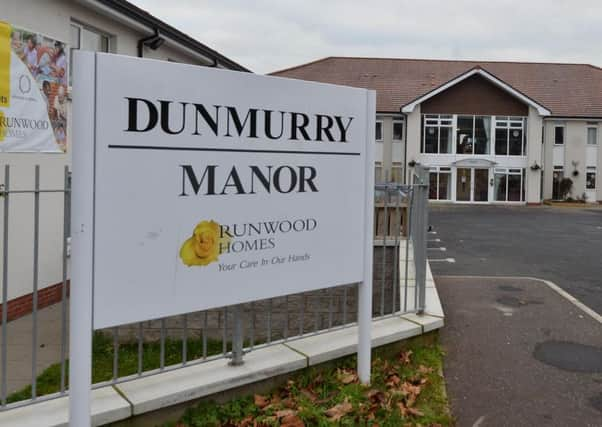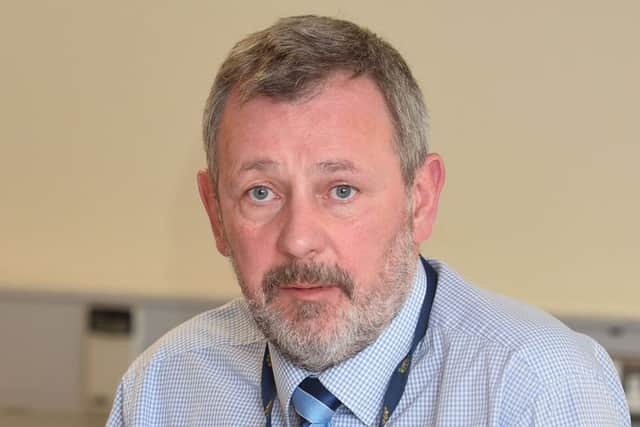Sanctions on private care homes possible


Additional sanctions against private companies who fail to provide an adequate standard of care will now be considered, alongside other wide-ranging actions including an “independent review” of how the Health and Social Care system acted in relation to the home.
The Commissioner for Older People in Northern Ireland, Eddie Lynch, earlier this month published the findings of a 16-month investigation into Dunmurry Manor care home on the outskirts of Belfast.
Advertisement
Hide AdAdvertisement
Hide AdMr Lynch’s probe, which was launched after concerns were raised about the home by families and whistleblowers, uncovered what he described as a “horrific catalogue of inhuman and degrading treatment”, including the sexual abuse of vulnerable residents by other residents.


Following the probe, the families of Dunmurry Manor residents had called for steps to be taken to ensure the problems uncovered at that home didn’t happen again.
Public confidence in the care system has been rocked by the findings.
Julieann McNally, whose late grandmother Annie McCourt was a resident at Dunmurry in 2016, told the News Letter the USPCA “would treat animals better than the care given to older people in Northern Ireland”.
Advertisement
Hide AdAdvertisement
Hide AdThe top civil servant at the Department of Health, Richard Pengelly, has now issued a public apology, exactly two weeks after Eddie Lynch’s investigation findings were published.
He outlined a series of 12 actions his department is taking.
“In publicly saying sorry to residents and families who were let down, I must acknowledge that words alone are not enough. Action must, and will, be taken to ensure that failings are not repeated,” Mr Pengelly said.
He was speaking after convening a “summit” attended by senior officials from his department, Health and Social Care trusts, and the Regulation and Quality Improvement Authority (RQIA) to discuss care home provision.
Advertisement
Hide AdAdvertisement
Hide AdHe told the officials at the meeting that “public concern over the quality of care home provision must be addressed.”
Mr Pengelly said: “I want to re-emphasise that we are taking the report on Dunmurry Manor by the Commissioner for Older People very seriously.”
He continued: “Our first priority has been to seek assurance on the current standard of care at the home.
“That has been provided from Health and Social Care colleagues, as well as through the independent assessment work which we commissioned.”
Advertisement
Hide AdAdvertisement
Hide AdThe permanent secretary at the Department of Health continued: “While I was pleased to hear of the very positive feedback given to RQIA by families of existing residents of Dunmurry Manor at a recent meeting, it is clear that unacceptable failings in care occurred repeatedly in the past.”
He added: “Dunmurry Manor must serve as a stark reminder to the HSC system of its responsibilities.”
Steps announced by Department of Health
• An independent review of actions by the HSC system in relation to failings at Dunmurry Manor, identifying lessons for the future — in in addition to the formal HSC response to the Commissioner’s report.
• A workshop event involving HSC bodies, alongside ‘patient and family voices’ to address concerns around Dunmurry Manor and care home provision generally — with the aim of ‘embedding’ lasting improvements and lessons into the HSC system.
Advertisement
Hide AdAdvertisement
Hide Ad• A ‘scoping review’ on potential options for additional sanctions for private sector care home providers and companies responsible for serious failings.
• A public campaign to clarify and build awareness of how care home residents, families, staff and other concerned citizens can raise concerns and make complaints.
• An audit of safeguarding investigations in relation to care homes operated by the independent sector.
• Investment in improvement, recognising that, while vitally important, regulation and inspection will not deliver better care by themselves. In this financial year, £325,000 has been allocated to support nursing in-reach from Trusts to care homes. This means Trust identified nurses will work with and support the nursing and residential care home staff to look after all the needs of residents.
Advertisement
Hide AdAdvertisement
Hide Ad• Additional funding of £80,000 will support further enhanced clinical skills to meet complex nursing care needs in nursing homes.
• A new senior nursing post at the Public Health Agency is being established, dedicated to working with independent sector nursing homes and acting as a central point for the HSC to enhance quality and safety of care for patients and residents.
• Identification of a dependency tool to help ensure appropriate staffing levels for nursing homes. This is the latest stage of the roll-out of Delivering Care, the department’s policy on safe staffing.
• A measurement framework for nursing care which has been devised and tested in acute hospital wards will be reviewed for nursing homes. It will include eight key indicators that measure the impact of nursing care.
Advertisement
Hide AdAdvertisement
Hide Ad• The Department will support implementation of initiatives aimed at improving the quality of life for people living in care homes such as the My Home Life initiative
• The Department has also recognised the need for long-term transformation of adult social care, as underlined in the expert panel report published in December. A project team is taking this reform agenda forward with a carers’ panel being recruited. The next phase will include a far-reaching public debate, highlighting the major challenges for policy makers and society as a result of demographic changes, investment needs and the vital importance of staff recruitment, retention and development. The public concern currently evident on care homes provides evidence of the need for change.